

How Literacy Created Civilisation, Part I: In the Beginning Was the Word
source link: https://sjquillen.medium.com/how-literacy-created-civilisation-part-i-in-the-beginning-was-the-word-8984175402b
Go to the source link to view the article. You can view the picture content, updated content and better typesetting reading experience. If the link is broken, please click the button below to view the snapshot at that time.
How Literacy Created Civilisation, Part I: In the Beginning Was the Word
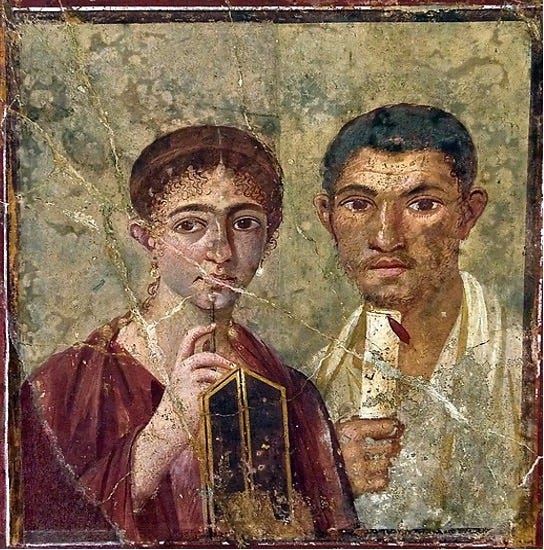
This couple from Pompeii were keen to show off their education.
From Jean-Jacques Rousseau onward, it has been a popular lament among philosophers that civilised society is an unnatural habitat for human beings. Linguists could make an analogous point: while spoken language is hardwired into our brains, writing is a recent development, invented by an elite few in only a small handful of societies, and imposed on everybody else.
The critical factor that powered the leap from our hunting-gathering state of nature to civilisation is generally considered to be agriculture. But people had been sowing and harvesting their favourite plants for centuries before the first cities sprung up in Mesopotamia. In order for society to become more complex than tribal units, people needed some means of conveying vital information, like taxes and commercial transactions, that did not rely on personal trust or imperfect human memory.
Cuneiform, the first writing system that arose in Mesopotamia around 3200 B.C., began basically as a system of tally marks pressed into clay tablets. The other early civilisations’ writing systems had similarly banal beginnings: Egyptian hieroglyphs and Chinese characters began as simple pictures of what they represented. One can still find traces of this in modern Chinese (and Japanese): my favourite character, 帝, meaning “sovereign,” looks like a guy wearing an impressive hat.
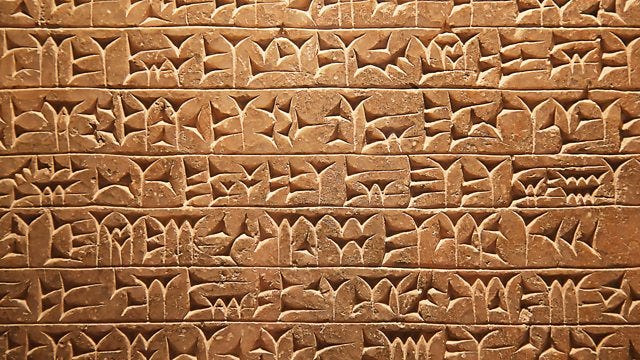
Cuneiform was written by pressing the edge of a reed into clay. Over centuries, the meanings of the marks became more abstract, and subject evolved from grain tax records to the Epic of Gilgamesh.
Over time, the symbols became more abstract. The Chinese, for example, needed a fairly wide vocabulary for writing questions on bones, which were then roasted to get an answer from the gods. By around 2000 B.C., Mesopotamian scribes were recording the great epics of their culture. Writing was traditionally viewed as clerks’ work, scoffed at by men of power, but that changed as kings developed from glorified warlords into rulers of vast, complex empires. King Ashurbanipal of Assyria (r. 669–631 B.C.) was almost comically proud of his ability to read: a lot of what has come down to us from remote antiquity are his proclamations bragging about all the things he read.
It is impressive how numerous civilisations, from China to Egypt to Central America, all independently invented writing as a means of facilitating the development of complex civilisation. The one exception almost strengthens the argument. The Inca never wrote, but instead used quipu ropes with knots to record information, the same function served by writing elsewhere. But their system never evolved beyond basic accounts, and their entire civilisation evaporated on contact with 168 Spaniards armed with guns, germs, steel, and the Latin alphabet, leaving nary a historical trace.
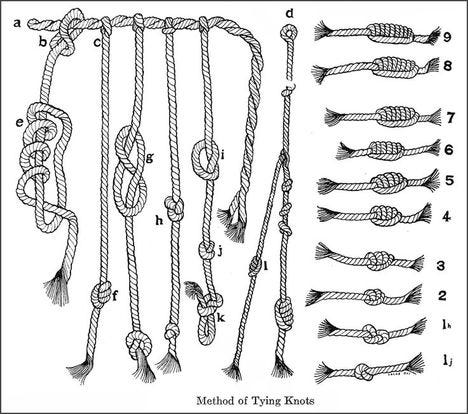
The quipu ABCs
In early civilisations in which great cities boasted 50,000 or so inhabitants and 95% of people lived off the land, a small caste of erudite scribes was sufficient to keep things running smoothly. But in a complex urban society supported by millions participating in the secondary and tertiary sectors of the new economy, demand for literacy percolates down to a wide share of the population. In the Roman Empire, it is estimated, as many as 30% of people could read.
The trends that undid the Roman world illuminate the vital relationship between literacy, economic sophistication, and what we think of as civilisational advancement (the former two being the font of the latter). In the 5th Century, trade ground to a halt and cities emptied thanks to invasion and political instability. But Rome could have recovered, as it did from very similar crises in the 3rd Century. It should be noted that the dusk of the Dark Ages coincided with the choking off of papyrus imports from Egypt, pulling from Europe the ancient world’s best, cheapest writing medium.
With nothing to write on except expensive vellum (calfskin), letters vanished from most people’s daily lives. Illiteracy and radical economic simplification ran together in a vicious cycle: with cities unsafe and unsupplied with trade, more people lived off the land, and had no need to read; fewer people could read, so mass commerce and administration became impossible; and so on into the abyss.
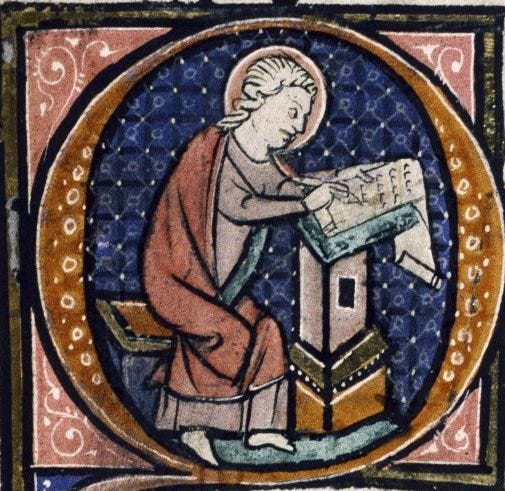
The prevailing medieval attitude toward reading was roughly similar to that toward computer coding in the 2000s: it was cool and we needed it to do some sophisticated things, but nobody other than a small class of studious nerds needed concern themselves with it.
Meanwhile, far to the east, cycle was turning the opposite way. In China, cheap paper enabled more people than ever before to keep records and access information. Trade boomed and administration streamlined across the vast, united empire. Even as the Islamic world fractured politically, the introduction of paper fueled a cultural golden age.
In the late Middle Ages, Italian merchants adopted two critical innovations from the East: paper and new, more efficient numbers (we call them Arabic numerals, but they were invented in India). These facilitated a boom in commerce, education, and culture that we call the Renaissance. Another literary invention catapulted the West to the pinnacle of the world.
Someone in Korea actually built a printing press centuries before Johannes Gutenberg, but movable type is fatally cumbersome for a language of thousands of unique characters. What it wrought in the land of the Latin alphabet can only be described as an information revolution. Without it, the Protestant Reformation and the Enlightenment may well have been snuffed out, as were a whole range of revolutionary movements in the days when the only books were in monasteries.
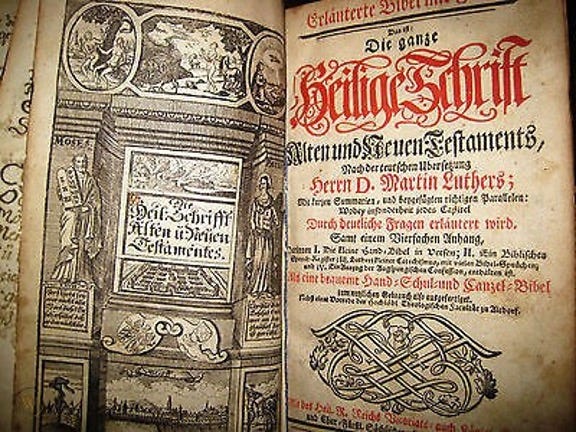
Evangelical printers churned out editions of Martin Luther’s German translation of the Bible faster than the Catholic authorities could burn them.
Protestantism itself played a critical role in the development of literacy. Whereas the medieval Church restricted access to the Bible and forbad its translation (to be fair, translation does inevitably entail some shift in meaning, which is a touchy subject when one is dealing with the word of God), Protestants held that all believers should access God directly through Scripture.
When Puritan (i.e., radical Protestant) Englishmen arrived in Massachusetts, one of the first things they did was to establish a rigorous system of public education. New England quickly grew from a desolate wilderness to the most educated and wealthy region of the world. When the Swedish Riksdag (Parliament) passed a law in 1686 mandating that every child be taught to read the Bible, only a small share of Swedes were literate. By 1800, they practically all were, and Sweden was on her way from the poor, frigid backwater of Europe to what she is today.
In Northern Europe, the cycle of literacy and economic and cultural advancement started to whir in a virtuous spiral. As people poured into booming industrial cities, urban life and technical jobs demanded that they learn to read. Literacy enabled a growing middle class of managers, accountants, and lawyers to distribute goods and services in an exponentially more sophisticated and profitable market.
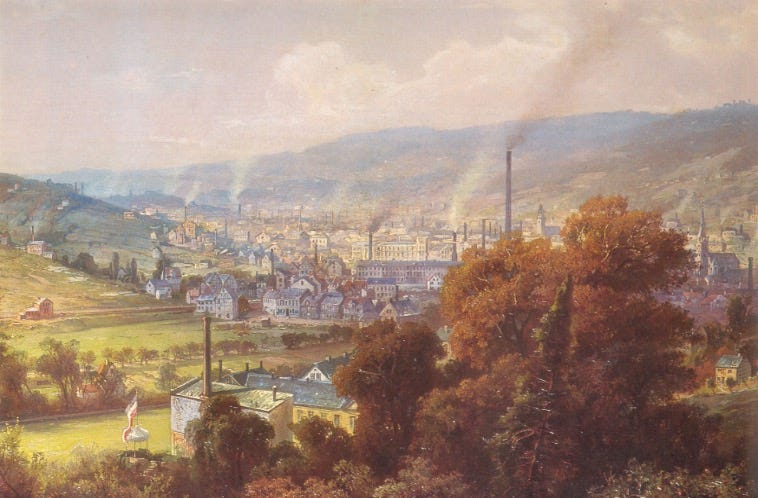
As conservative Victorians watched England’s pretty countryside taken over by “dark, Satanic mills,” many loudly remembered that mastery over nature of this sort had been what tempted man out of Eden. Ironically, their understanding of Scripture, and the revolutionary transformation of their country, sprang from the same origin.
The bucolic England of halcyon Victorian memory was a nation that lived off the fat of the land as countless generations before had done. But thanks to the Protestant zeal for teaching everyone to read, they had been caught up in radical ideas and created a whole new industrial society; all three trends fed the others, until Europe and the world were utterly transformed. None of it would have been possible without twenty-six simple characters.
Recommend
About Joyk
Aggregate valuable and interesting links.
Joyk means Joy of geeK